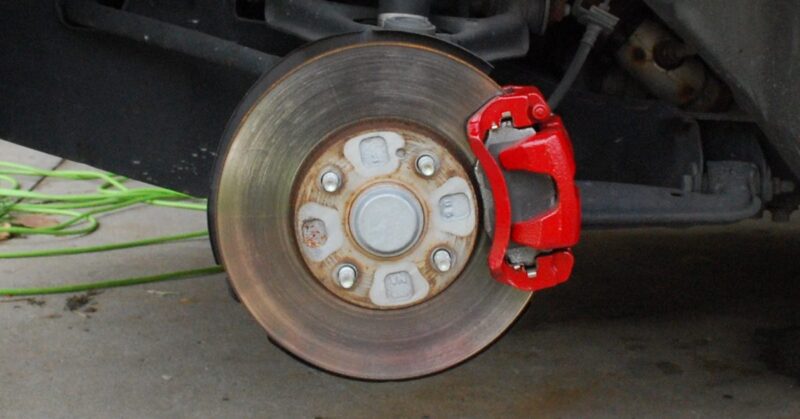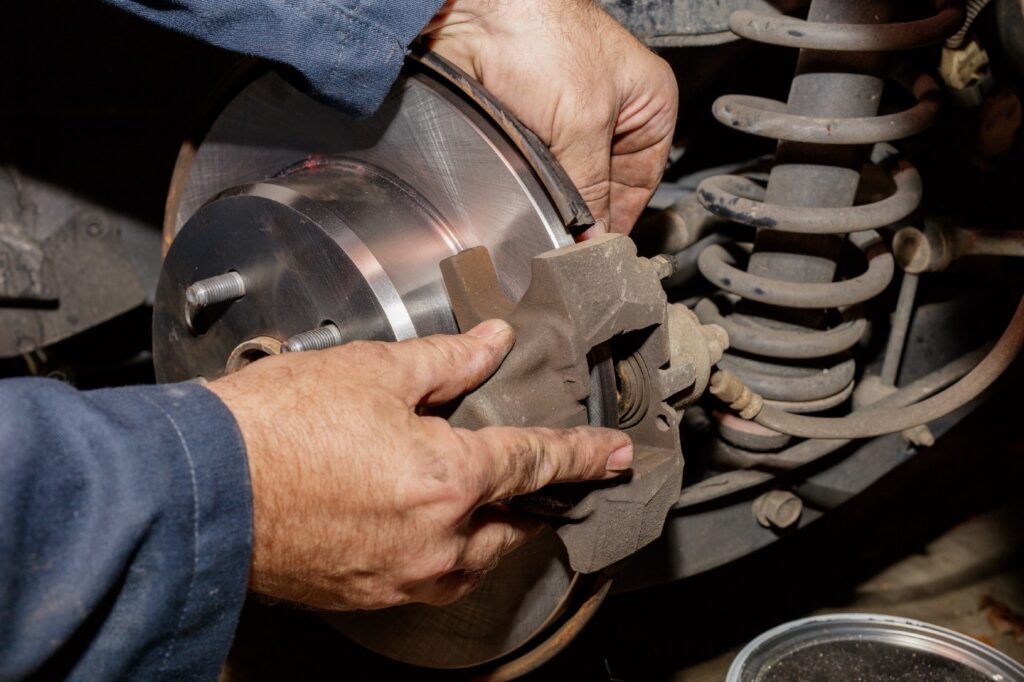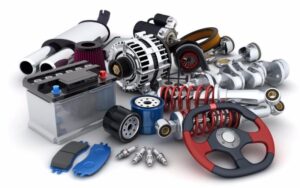
What Is a Brake Caliper on a Car & Symptoms of a Bad One
Vehicle braking systems include many important components. Here are the lines, pads, and rotors. But what are brake calipers? While calipers are a critical part of keeping your vehicle’s brakes working, their actual function isn’t widely known. When you hit the brakes, the brake calipers are a critical part of bringing your car to a stop.
They are arguably one of the most important brake components. That said, let’s break down what they do, why they matter, and what you can do to keep them looking their best.
What is a Brake Caliper?
Calipers are part of the disc brake system, and most cars have this type of front brake.
Brake calipers house the car’s brake pads and pistons. Its job is to slow the wheels by creating friction with the brake discs.
Brake calipers are like clips on a wheel rotor that stop the wheel from turning when you apply the brakes. Inside each brake caliper is a pair of metal plates called brake pads.
When you press the brake pedal, the brake fluid creates pressure on the pistons in the brake calipers, forcing the pads against the discs, and slowing the car.
How Does a Brake Caliper Work?
When you press the brake pedal, force is applied to the wheel through the brake fluid in the network of lines and hoses. Attached to each wheel is a heavy metal disc called a brake disc. As the wheel rolls on the road, the rotor spins with it. Each rotor is encased by a pair of brake pads suspended in a hydraulic clamping mechanism known as the caliper.
Calipers work much like clamps. Depressing the brake pedal or pulling the brake lever, the piston pushes out the pad inside the caliper, making it come into contact with the spinning rotor. The resulting frictional force slows the car down.
How are Brake Calipers Connected to the rest of the Braking System?
The brake caliper assembly is usually located inside the wheel and delivers brake fluid to the system through conduits, hoses, and valves and is connected to the master cylinder. We could talk about brake calipers for days on end, but we’ll show some restraint. Here’s what you really need to know: Your brake calipers are very important.
When Brake Calipers Go Bad
Generally speaking, brake pads and discs are worn and need to be replaced much more often than calipers. However, the main cause of caliper damage is driving the vehicle on worn brake pads or twisted rotors. Both prevent the system from dissipating frictional heat as it was designed to damage the calipers.
If the pads fail to insulate the caliper from overheating, the piston can be damaged, or heat can be transferred through the piston into the brake fluid, causing the brake fluid to degrade. The latter can lead to brake failure.
A damaged piston or simply corroded piston may be stuck in one position. If it gets stuck in the retracted position, that wheel will lose its braking ability. If stuck in the engaged position, the wheel will continue to brake until released.
Symptoms of a Bad Brake Caliper

When certain parts of the car fail, you start to notice different signs of anomalies. Yes, all the components that make up multiple systems and modules can eventually fail, especially if they are ignored during maintenance inspections.
But brake calipers are essential and can lead to accidents when defective. In other words, the braking system should be taken seriously. Therefore, we have listed the most common signs of brake caliper failure:
Brake Fluid Leak
One of the classic symptoms of a faulty or defective brake caliper is leaking brake fluid. Rubber seals and boots keep brake fluid from leaking. However, with continued exposure to the extreme heat from braking, these seals can wear and lead to leaks over time. A leaking brake caliper can affect the pressure sealing ability of the braking system. Failure of the pressure seal capability can significantly reduce the ability of the system to stop or slow down.
Car Parked Aside
Does your car swerve or veer to one side while driving? Well, this anomaly is explainable. The calipers have pistons that can move in and out due to hydraulic pressure from the master cylinder. If the piston stops working due to corrosion or debris, the brake pads will not be able to release (or connect) the rotor. As a result, the vehicle will pull towards or away from the side where the faulty caliper is located. This can happen when you are exercising or hitting the brakes.
Disturbing Sounds and Smells
If you don’t replace defective calipers in a timely manner, you expose brake components to extreme heat and burning. Over time, overheated or burnt parts can cause the vehicle to screech and smell bad. Like any other component in a vehicle’s braking system, worn brake calipers can compromise safety and affect performance. If you suspect any problem with your brakes or calipers, have your car inspected by our experts.
Reduced Braking Force
You may notice a reduction in braking power when any brake system component, including the brake calipers, is damaged. Every time braking force is reduced, the odds of an accident for a passenger increase. Therefore, it is very important to resolve any braking problems as soon as possible.
Brake Warning Light
If a defective brake caliper causes brake fluid loss, the engine control module will recognize this. So it will activate the brake warning light on the dashboard.
Soft Brake
When you hit the brakes, you feel some resistance. If they feel spongy or the pedals go all the way to the floor, this could indicate moisture or air in the braking system or a problem with the master cylinder. When you notice these problems, you must go to a reliable service center such as Sweeney Buick GMC.
The best way to detect defective brake calipers is to check the brake system frequently. After all, pros can easily spot early warning signs of caliper failure – weak guide pins, leaks, dirt buildup, corrosion, etc. – before they escalate.
Shaking or Vibration When You Apply the Brakes
If the steering wheel or car vibrates or vibrates when braking, the thickness of the rotors may be uneven. Over the years, the rotor surface wears and may become irregular. When the brakes are applied, braking friction transfers the pad material to the rotor surface. Vibration may occur during braking if the brake pad material is not transported uniformly.
How Often Do You Need to Replace Brake Calipers?
Brake calipers have a tough job considering their role in your braking system. They are born to be strong, durable, and to win through the literal pressure of doing their job. However, factors such as hard braking or a lack of regular maintenance can lead to premature wear of the brake calipers. Fortunately, brake calipers last 100,000 miles or 10 years, so with proper driving, you can use the same calipers for 10 years.
Summary
Because your brakes are your first and most important safety feature, it’s helpful to have them checked regularly. However, while you already know how long your brake calipers are and how often they are replaced, it’s helpful to understand their condition and be aware of any other braking issues before they affect your entire system.


Average Rating